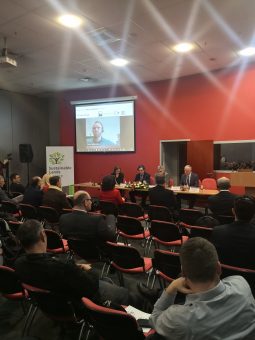The development of sustainable energy projects, including finance and advisory services, makes the core business of E3 International (E3I). Bonnie Norman, president of E3 International and well-known advisor on the creation of green banks, has more than two decades of experience in strategic consulting. We talked with Bonnie about use of renewable energy sources and energy efficiency, and she filled us in on new program that should enable creating of energy farms at abandoned land in Serbia.
EP: What projects are in focus and how long has E3I been present in this region?

Bonnie Norman: E3I collaborates with clients to create and scale up bankable sustainable energy solutions for a healthier and more resilient world. We offer sustainable energy project development, finance, and advisory services from offices in Belgrade, the EU, and the US, where we’re headquartered. Our team has been working in Southeast Europe and the Western Balkans for the last 20 years. We are a motivated group of experts dedicated to making a difference locally, regionally, and beyond.
The E3I team began its regional involvement in 1999 as the implementing partner for the European Bank for Reconstruction and Development’s (EBRD’s) Municipal Energy Efficiency Program in Bulgaria. In 2010, E3I expanded its regional work, as implementing partner for EBRD’s Western Balkans Sustainable Energy Finance Facility (WeBSEFF). Through WeBSEFF, E3I has supported over 400 energy efficiency and renewable energy projects for commercial, industrial, and municipal enterprises and over EUR 200M in investment, and are developing new projects in Serbia for WeBSEFF financing. E3I is also pleased to serve as local implementing partner for the United States Agency for International Development’s (USAID’s) activity in Serbia to increase energy efficiency and the use of renewables in district heating.
EP: What’s your latest initiative?
Bonnie Norman: E3I recently kicked off its Sustainable Lands Initiative (SLI) for Serbia. The Serbia SLI puts government-owned abandoned and degraded agricultural land back in productive use, creating sustainable energy farms to support rural jobs and economic development and to improve the environment—air, soil and water quality, flood resilience, biodiversity, and native forest protection. Our goal is to catalyze EUR 3 billion in private investment—through the SLI’s planned Sustainable Serbia Finance Facility—to improve tens of thousands of hectares of abandoned land and associated rural lives, with a positive return for investors projected in 5-6 years on a 20-year project life.
EP: What’s the driving forces behind the Sustainable Lands Initiative (SLI)?
Bonnie Norman: Several factors are contributing to why the time is right for the Serbia SLI. We’re in a climate crisis—globally glaciers are melting, annual average temperatures are at record highs, extreme weather events are increasing, and locally air quality in Serbia this year has been a focal concern. We have only a short time to avert disaster, to keep global warming under the 2 degrees Celsius threshold by 2030.
Importantly, Serbia has 1. 6 million hectares of abandoned and degraded agricultural land no longer suitable for food production. This land could quickly help provide a natural capital solution to Serbia’s climate challenge as locations for fast-growing wood biomass plantations for energy or for other renewable energy “farms”, like solar, wind and geothermal. Use of cleaner fuels would improve air quality, and co-firing of wood biomass in coal boilers–which can be done right now–would dramatically reduce the contributors to smog in the near term.
The demand for wood pellets and chips regionally and globally is growing beyond the limits of what Serbian forests can sustain. Harvesting fast-growing willow or poplar after 3-4 years makes more sense than depleting forests of mature trees. Creating a stable and predictable biomass market through the creation of biomass centers, as in Lithuania, will protect individuals and businesses from price spikes due to supply constraints – price spikes which would affect the most vulnerable populations disproportionately.
At the Energy and Investment Days in Novi Sad, held in February, biomass expert Professor Glavonjic called fast-growing wood biomass plantations “Serbia’s oil”. Wood chips and pellets from these plantations can be used as a secure local energy source and for export.

Serbia has rural economic challenges which this initiative would address, including declining rural village populations with farmers needing additional sources of income and youth seeking more opportunities. Fast-growing wood biomass plantations are harvested in the winter, when the farmers do not have work, and use conventional farm equipment. Since these plantations (or coppices) will be grown on abandoned, degraded land, they will add to what is currently under cultivation. Adding solar PV, wind, or geothermal farms, where best suited on abandoned, degraded land tracts, will improve the overall investment opportunity and provide next generation local jobs.
EP: What synergies support SLI’s intended transformative results?
Bonnie Norman: The Serbia SLI has synergies with EU programs to support its advancement from donors and partners. It aligns with the objectives of the new European Green Deal, the EU Energy Barge initiative for the Danube, as well as the Dendromass4EU project, which highlights bioeconomy innovation along with cultivation of short rotation wood biomass plantations for sustainable energy. Ikea is a partner in that ongoing effort, along with the European Commission, University experts, and others.
In addition, the Serbia SLI will adapt from the State University of New York (United States) its proven model for commercial short rotation wood biomass production. The SLI targets including Development Credit Authority guarantees currently available through USAID in Serbia for small farm enterprises.
Lastly, the SLI will be structured to spark much new private investment, by securing large credit worthy biomass supply off-takers such as electricity, district heating, or industrial companies. A blended finance approach through the SLI’s planned Sustainable Serbia Finance Facility will result in flows of capital to achieve results at scale, leading to a green bond and further investment. We will build on the learnings of two similar successful (at scale) land recovery finance facilities created by now Assistant Secretary General of UNEP, Satya Tripathi, who has been an inspiration and SLI advisor from the start.
In focus:
EP: Who else is on board?
Bonnie Norman: E3I has received interest and support from the Republic of Serbia at the highest levels, an MOU with the Autonomous Province of Vojvodina, where much suitable abandoned land is located, industry partners, leading NGO partners, international and local development finance institutions, local associations, the Serbian Chamber of Commerce, the banking community, and a wide variety of other stakeholders. We welcome all partners to create impact at scale for the Serbia SLI as quickly as possible.
EP: What’s next?
Bonnie Norman: With donor support, we are completing our feasibility analysis on several key components ahead of project initiation and demonstration starting later this year. With the support of the United Nations in New York, we have targeted a formal launch at COP26, the United Nations’ pre-eminent annual climate convening of which Serbia is a Vice President in 2020. The goal is for the SLI to highlight Serbia’s innovation and leadership in addressing its climate change objectives at scale.
This interview was published in the new issue of the Energy portal Magazine NATURAL RESOURCES, march – may, 2020
